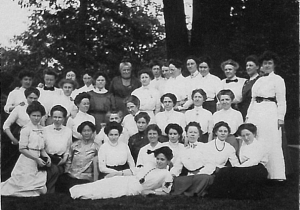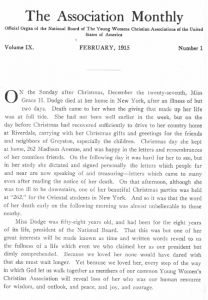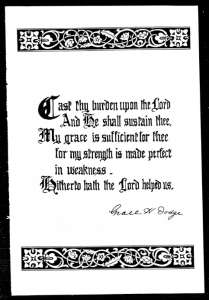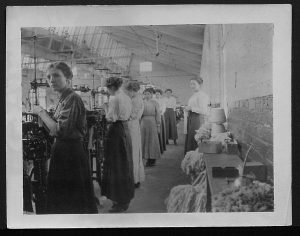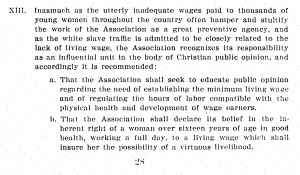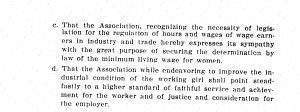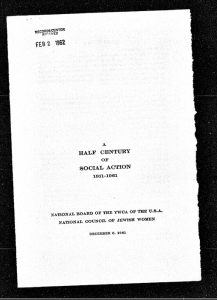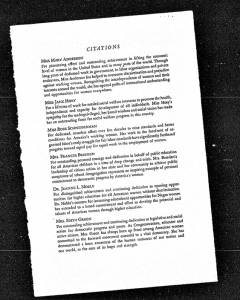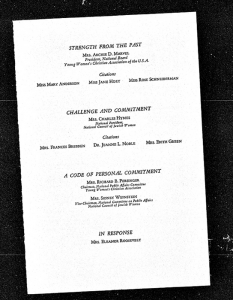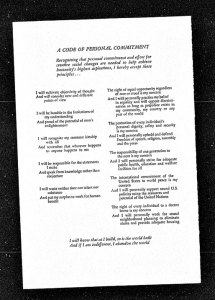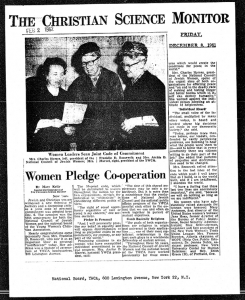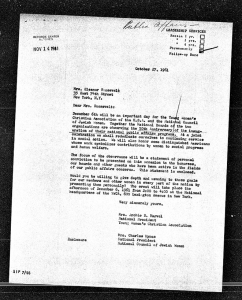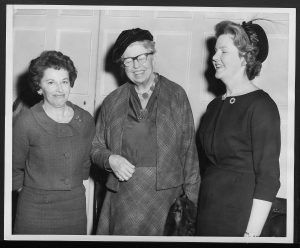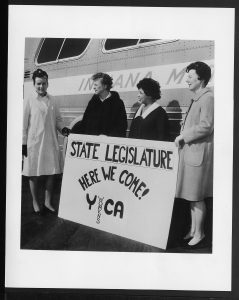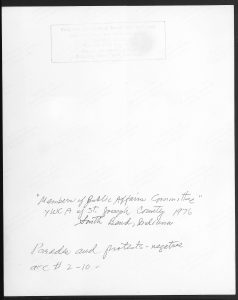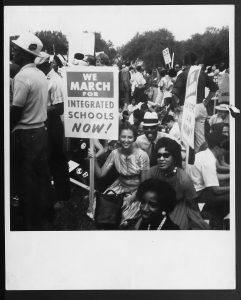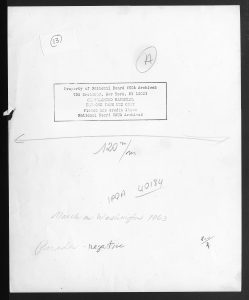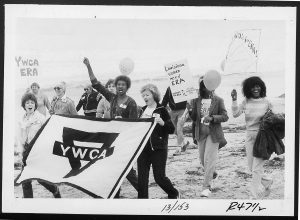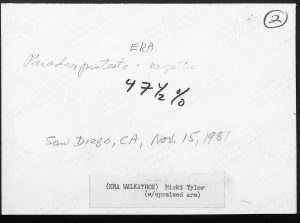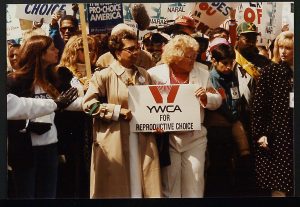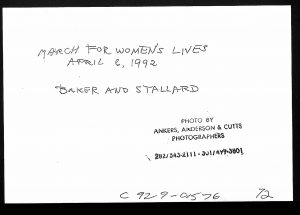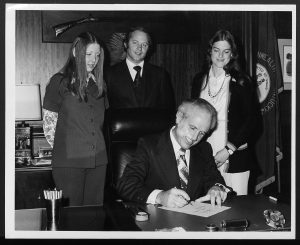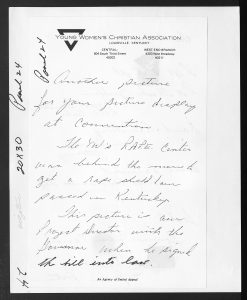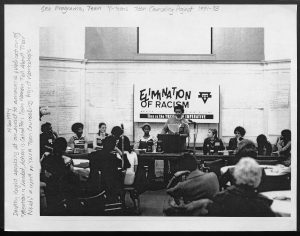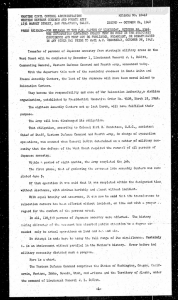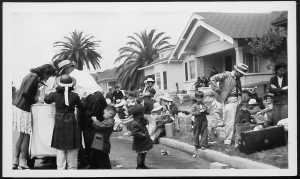Above: Grace Dodge with a National Training School class circa 1912
Today we say Happy 161st Birthday to Grace Hoadley Dodge, a founding member and the first president of YWCA of the U.S.A. National Board. She was born on May 21, 1856 in New York City to a prominent family of great wealth. For the duration of her life she used that position to work tirelessly, humbly and graciously in service of others, particularly young women and young women workers.
Grace Dodge was a founding member of many significant philanthropic and activist organizations like Working Girls’ Clubs, The Girls Athletic League, The National Travelers’ Aid Society, and the Teachers College in New York City, which later became a school of Columbia University. She also worked at the American Vigilance Association, sat as the President of the board of trustees for The American College for Girls in Constantinople, and was the first woman to be appointed as a member of the Public School Board of New York City in 1886. In all of these organizations she held prominent leadership positions. In her life she gave copious amounts of financial support to their projects and campaigns, and in her death she willed most of her money to these organizations. The largest single posthumous donation went to the Young Women’s Christian Association, an organization for which she was founder, broker and fearless fledgling leader at the time of her early, sudden death.
Grace Dodge’s work at the YWCA began when she mediated the merger of two women’s advocacy groups in the United States into a national Young Women’s Christian Association. In her time at the YWCA she worked on fundraising campaigns, most notably the $4,000,000 YMCA-YWCA campaign that took place in New York City in 1913. She met weekly with young women staying in boarding houses and used those conversations to write the book A Bundle of Letters for Busy Girls which compiled practical advice on life and homemaking for girls and women who might have missed those lessons in youth.
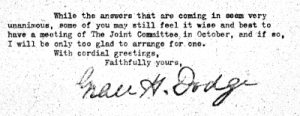 Note from Miss Dodge to Joint Committee
Note from Miss Dodge to Joint Committee
In the discussions she held with girls and women, and the people she employed, she always stressed the importance of accepting difference, and respecting those who had led lives different that one’s own. She also stressed the importance of honesty and full disclosure in these discussions, and advocated for comprehensive sex education and care in the classes and trainings that she sponsored. She urged older women to be honest with young women about their lives, and to be open about their mistakes and failures, so as to advise and comfort girls who had or could have made the same mistakes.
After her death she remained an inspiration and a beloved figure in the history of the YWCA. In 1921 a hotel was erected in Washington D.C. and named in her honor. The Dodge Hotel was created to provide young women, who at the time were moving to D.C. for employment opportunities developed by World War I, with safe and comfortable living conditions. It also acted as a temporary residence for women who had been displaced by the War, and were in transition. It honored her legacy by investing in individual women, giving them the opportunity to live comfortably and happily, in order to give them the opportunity to work and provide for themselves.
Grace Dodge was loved and respected by everyone that she knew. In the wake of her death the YWCA publication Association Monthly published a special edition dedicated to her, filled with essays that people had written in her honor that highlighted her work at the YWCA, but focused much more on uplifting the legacy of her character. She was beloved. The people who wrote for the publication in her honor, who spoke at her memorial service, or who otherwise published a dedication to her spoke primarily of her kindness, her generosity, her deep religious faith, and her legendary spirit, describing it as a source of inspiration.They described her tireless work ethic, her unending support of and respect for the people she employed, and those she was working on behalf of as a means of enabling those she touches to do the same work that she was doing. One wrote, “She lived her life full of sympathy,” and another “We have lost our best friend, one who always had loving words, kind thoughts and sympathy for lonely ones.”
Happy Birthday Grace Hoadley Dodge! Thank you for the legacy you built for the YWCA and for all the work you’ve done on behalf of young women everywhere.
This information was found in the YWCA of the U.S.A. records housed in the Sophia Smith Archive at Smith College in Northampton Massachusetts. Historical and Biographical information, testimonies and memorial service documents were found on reel 116 microdex 2 and Grace Dodge Hotel information was found on reel 43 microdex 2 of the microfilm series. Other information, essays about Grace Dodge, can be found in Association Monthly volume 9 no. 1 published February 1915, and in a special edition of Association Monthly dedicated to Grace Hoadley Dodge published in 1915. This project is digitizing these records in the effort to increase and diversify access to records, writings and testimonies like these about significant people, events and activist efforts of the YWCA.
–Gracie Elliott, Project assistant

